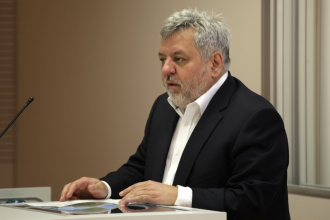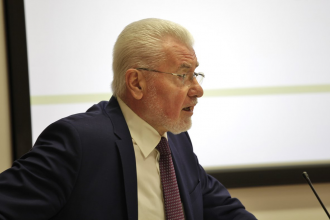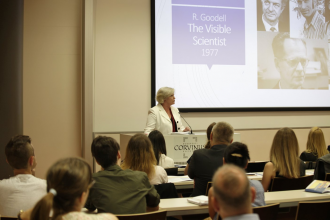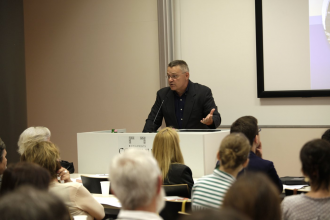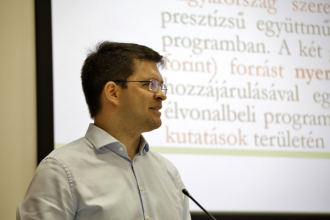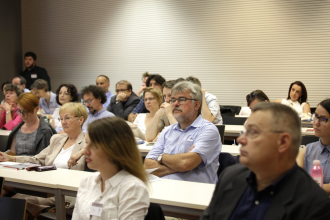The Institute of Behavioural Science and Communication Theory of Budapest Corvinus University (BCU) organised a conference on 11 May. In his opening speech, József Pálinkás, reviewing the tasks of science communication, stressed that besides up-to-date encouraging of the scientific publishing, sophisticated dissemination of knowledge, and popularisation of science, the science communication should be made part of the science funding systems, competition models, and requirement systems.
The conference was opened by András Lánczi, Rector of BCU.
In his welcome speech opening the conference, András Lánczi greeted the attendants of the first Hungarian conference on science communication. The Rector expressed his pleasure that a university of social science serves as venue of the first such professional forum. This enables the study of the topic from different viewpoints, and facilitates the proposals to the popular presentation of social scientific research results.
In his lecture, József Pálinkás, using his toolkit of a science politician and science organiser, illustrated with examples the ways how scientific institutions and research funding organisations can take part in shaping the approach of science communication. Can science speak the language of those who would use its achievements? – asks József Pálinkás to inspire researchers invited to give an account of their results funded from public competitions. In his presentation he spoke about the tools with which the National Research, Development and Innovation Office continues to encourage development of the system of competitions and evaluation also at its regularly organised RDI fora, as well as strategic and policy drafts and publications. Stars or heroes of science, research, and innovation are key players of successful science communication, if they can present their results comprehendible from the viewpoint of social benefits. This is the idea that lies behind presenting successful proposers at the website of the NRDI Office: a showcase of the ones who implement the most promising and most successful publicly funded projects.
The President of the Office underlined that the open access of publicly funded research results may cause transforming principles of research support and science evaluation. He said that the transformation of science funding systems, and widely available internet technologies led to an initiative aiming the open online access to research results. József Pálinkás added: among the first five EU member states Hungary joined the countries supporting the so-called gold route access. Gold route means that publications of publicly funded projects should be published in open access journals. For devising national level solution proposals for policy-strategic tasks of issues of open access and open science, the Office founded an Open Access Expert Committee in accordance with OECD and EU endeavours for open access and open science. The Open Access Expert Committee devises proposals, concepts on fields of legislation, government policy, strategy and finance.
Petra Aczél, Director of the BCU Institute of Behavioural Science and Communication Theory, in her plenary presentation reviewed the results of their science communication research group. The sciXcom model proposed by them offers a set of criteria needed for the evaluation of today's science communication, equally reflecting the characteristics of institutions, funding agencies, and various fields of science, she said.
György Fábri, associate professor at Eötvös Loránd University underlined in his plenary talk: raising awareness of the diversity of a scientific researcher's role strengthens the visibility of scientific research and the efficiency of science communication. Besides the a working researcher, science communicator and science organiser can be also part of a new approach of the researchers' role. In his lecture, György Fábri stressed that authentic information is also a core responsibility of science communicators, helping the audience sort out fake news.
Bálint Molnár, head of the communication unit at the National Research, Development and Innovation Office presented how the Office assists the orientation of the applicants and the press with comprehensive content management through several information channels. In his presentation "Visible and transparent" he presented practical examples of key considerations the Office observes while publishing news and reviews about research and innovation related issues.







